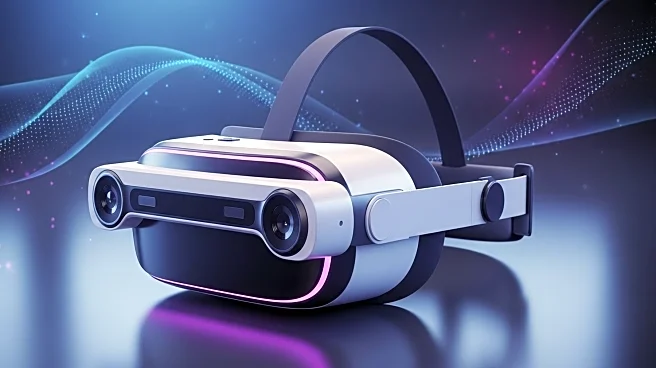What's Happening?
The year 2025 is witnessing significant advancements in augmented reality (AR) technology, with major companies like Meta and Amazon making notable strides. Meta has launched Ray-Ban smart glasses with integrated displays, marking a shift towards mainstream AR adoption. Amazon is reportedly developing its own AR glasses, potentially intensifying competition in the consumer market. Snap has enhanced its Spectacles with GPS and hand-tracking capabilities, expanding the scope of location-based AR experiences. These developments are part of a broader trend where AR is becoming more practical and accessible, with a focus on simpler displays and user-friendly applications.
Why It's Important?
The advancements in AR technology are poised to reshape consumer interactions with digital content, offering new ways to engage with information and entertainment. The competition between tech giants like Meta and Amazon could lead to more innovative and affordable AR products, benefiting consumers. The integration of AR in everyday devices like glasses suggests a future where digital overlays become a common part of daily life, enhancing activities such as shopping, navigation, and fitness tracking. This shift could also drive growth in the AR/VR market, with analysts predicting a significant increase in shipments, indicating a growing consumer interest and market potential.
What's Next?
As AR technology continues to evolve, consumers can expect more affordable and practical AR devices entering the market. Companies are likely to focus on improving battery life, comfort, and application utility to attract mainstream buyers. The competition among tech giants may lead to rapid advancements and new features, making AR a more integral part of daily life. Consumers should watch for reviews and consider the practicality of new devices before purchasing, as the market is expected to offer a variety of options catering to different needs and preferences.
Beyond the Headlines
The integration of biometric data into AR devices, as seen in Meta's research models, raises important questions about privacy and data security. As AR technology becomes more prevalent, regulatory frameworks may need to adapt to address these concerns, ensuring that user data is protected. Additionally, the cultural impact of AR technology could be significant, changing how people interact with their environment and each other. The potential for AR to enhance accessibility and provide new educational tools also presents opportunities for positive societal change.









